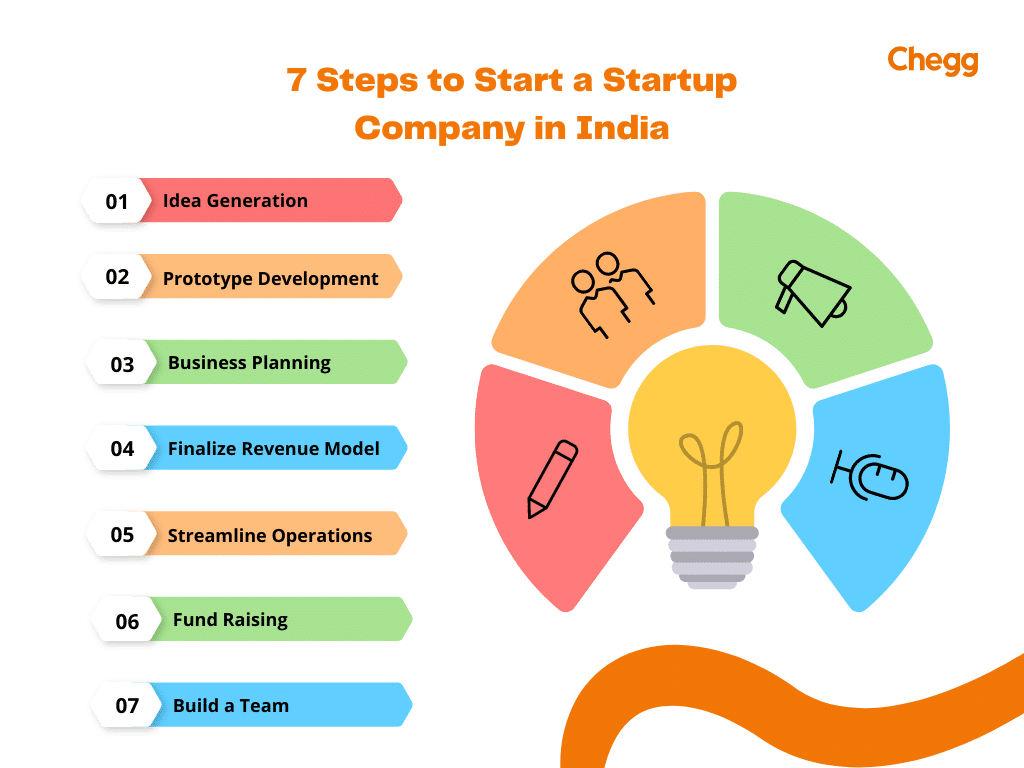
Quick Summary
Starting a Startup in India? This guide covers step-by-step registration, funding options, government schemes, and expert growth tips.
Learn how to legally register your startup, get funding, and scale your business in India’s booming entrepreneurial ecosystem.
Avoid common mistakes, leverage government benefits, and follow a proven roadmap to build a successful startup in 2025.
Starting a startup in India is an exciting journey filled with opportunities, challenges, and immense potential. With the Indian government actively encouraging entrepreneurship through initiatives like the Startup India Scheme, now is the perfect time to turn your innovative idea into a reality. This guide will walk you through everything you need to know about launching and scaling a startup in India , from legal requirements to funding options, compliance processes, and success tips.
Whether you’re a first-time entrepreneur or someone looking to expand your business, this article is designed to provide actionable insights and detailed information tailored specifically for the Indian audience. By the end of this guide, you’ll have a clear roadmap to navigate the world of startups and achieve your entrepreneurial dreams.
A startup is a newly established business that aims to solve a problem by offering innovative solutions. Unlike traditional businesses, startups often focus on growth and scalability. The Government of India defines a successful startups in India as:
India is the third-largest startup ecosystem in the world. As of 2024, over 90,000 startups are recognized under the Startup India initiative. Some key factors driving the best startups in India ecosystem include:
Here is the list of startup companies in India:
| Sector | Notable Startups |
|---|---|
| E-commerce | Flipkart, Nykaa |
| Fintech | Paytm, Razorpay |
| Edtech | Byju’s, Unacademy |
| HealthTech | PharmEasy, Practo |
| SaaS | Freshworks, Zoho |

Starting a startup in India can be an exciting and rewarding journey, but it requires careful planning, research, and execution. Whether you’re an aspiring entrepreneur or someone with a unique business idea, following a structured approach can increase your chances of success. Below is a detailed, step-by-step guide on how to start up a company in India to help you launch your startup smoothly.
The foundation of a successful startup in India begins with a solid business idea. This idea should address a real-world problem and offer a solution that people are willing to pay for.
A well-researched business idea forms the backbone of your startup in India, so take time to refine it before moving to the next step.
To operate legally, you need to register your startup in India with the relevant authorities. Here’s how you can registering a startup in India:
Legal registration ensures that your startup in India operates without legal hurdles and qualifies for government incentives.
A well-structured business plan acts as a roadmap for your startup in India, helping you stay on track and attract potential investors.
A strong business plan not only guides your startup in India but also improves your chances of securing funding from investors.
Most businesses require initial capital to get started. There are several ways to fund your startup in India, depending on your needs and business model.
Finding the right funding source can help your startup in India grow faster and scale effectively.
A successful startup in India requires a team of dedicated professionals who share your vision and can drive the business forward.
Hiring the right people will ensure that your startup in India grows efficiently and maintains a strong foundation.
Now that your startup in India is registered and ready to go, it’s time to launch and attract customers. A well-planned launch strategy can make a huge difference in your startup’s success.
An effective marketing plan ensures that your startup in India gains visibility and starts generating revenue from the beginning.
Starting a startup in India requires careful planning, legal compliance, and strong execution. By following these steps—choosing a profitable idea, registering legally, creating a business plan, securing funding, hiring a great team, and marketing effectively—you can set up a successful venture.
Recommended Read :- 50+ Incredible Small Business Ideas For 2025 And Beyond

The Startup India initiative, launched in 2016, provides various benefits to entrepreneurs, including:
Startup India Scheme pdf Download :- CLICK HERE
To officially register your startup, follow this step-by-step process:
For starting a startup in India and making it a private limited company, you have to consider many legal terms and conditions. Some legal aspects are as follows.
Choosing the right legal structure for your business is vital for its long-term success. You can register your start-up as a sole proprietorship, partnership, limited liability partnership (LLP), or private limited company. Each entity type comes with different tax obligations, liability protections, and ownership structures, so it’s important to select the one that fits your business goals. Consulting a legal advisor can help you make the right decision.
Many startups require different licenses that you need to obtain. For example, any food business would require an FSSAI license. You cannot start your own company unless you have a license. Likewise, other businesses will require a license that you must obtain.
To start a business in India, you must register your startup in India and get a GST registration. However, you will need an import and export license for international business.
If you have a new and innovative business or idea, you should get a trademark and patent. It is not compulsory, but it will protect your intellectual property and secure your business in the long run.
This is the most important step to help you launch and sustain a startup in the market. You have to spend a huge amount studying the market and creating a good marketing plan. Here are the steps you can use in marketing.
To start a startup company in India, you must follow all these aspects. These aspects must also be flexible, which means you can change them at any moment according to business requirements.
Many Indian startups have gained global recognition. Here are some notable examples:
These startups showcase India’s ability to innovate, compete, and grow on a global scale, making the country a major player in the startup ecosystem.
Once your startup is successfully established, the next step is to focus on growth and expansion. Scaling a business requires strategic planning, efficient operations, and strong marketing efforts. Here are some key strategies to help you scale your startup in India:
By implementing these strategies, your startup can achieve sustainable growth, attract more customers, and establish a strong presence in the competitive market.
Starting a business comes with its own set of challenges. Here are some common issues and solutions:
| Challenge | Solution |
|---|---|
| Lack of funding | Apply for government schemes, seek investors |
| Regulatory hurdles | Hire a legal consultant for compliance |
| Market competition | Focus on innovation and customer experience |
| Talent acquisition | Offer equity benefits and a strong work culture |
| Scaling difficulties | Develop a scalable business model |
Despite these challenges, the best startup companies in India is vibrant and full of opportunities. With the right support and resources, startups can overcome these obstacles and achieve success.
To increase the chances of success for your startup in India, follow these strategies:
Starting a startup in India is a rewarding yet challenging endeavor. By understanding the legal requirements, exploring funding options, leveraging government schemes, and learning from successful entrepreneurs, you can build a thriving business. Remember to stay compliant, avoid common mistakes, and continuously innovate to stay ahead in the competitive landscape.
With dedication and perseverance, your latest startups in India can achieve remarkable success. So, take the first step today and embark on your entrepreneurial journey!

A startup in India is defined as an entity under 10 years old, with a turnover of less than ₹100 crore, working towards innovation, development, or improvement of products or services.
Some of the top startups in India include CRED, PharmEasy, and Razorpay, known for their innovation and impact across fintech, healthcare, and payment solutions.
To start a startup in India, first validate your idea and research the market. Then, create a business plan, choose a legal structure, and register your startup business in Bangalore. Secure funding if needed, build a strong team, and develop a marketing strategy.
The cost to start a startup in India can vary widely depending on the type of business. On average, it ranges from INR 50,000 to INR 2 lakh. However, some businesses can be started with minimal investment or even no money at all.
To register your startup, visit the Startup India portal. Ensure your business meets the eligibility criteria, such as being less than 10 years old and having an annual turnover under ₹100 crore.
You can start a startup with no money by leveraging zero-investment business ideas such as freelancing, content creation, print-on-demand, online tutoring, and drop-shipping. These ventures require minimal upfront costs and can be operated from home.
Emerging fields like artificial intelligence, renewable energy, healthcare innovation, and agritech are highly promising for startups in India.
Some great startup ideas in India include e-commerce platforms, mobile apps, online education, digital marketing agencies, and sustainable products. It’s important to identify a gap in the market and offer a unique solution.
To register a startup company in India, you need to obtain a Digital Signature Certificate (DSC) and Director Identification Number (DIN). Then, reserve a company name, file incorporation documents with the Registrar of Companies (ROC), and obtain a PAN and TAN.
Bangalore is home to top startups like CRED, Razorpay, and Urban Company, which are leaders in fintech, payment solutions, and home services.

Authored by, Amay Mathur | Senior Editor




Amay Mathur is a business news reporter at Chegg.com. He previously worked for PCMag, Business Insider, The Messenger, and ZDNET as a reporter and copyeditor. His areas of coverage encompass tech, business, strategy, finance, and even space. He is a Columbia University graduate.
Editor's Recommendations
Chegg India does not ask for money to offer any opportunity with the company. We request you to be vigilant before sharing your personal and financial information with any third party. Beware of fraudulent activities claiming affiliation with our company and promising monetary rewards or benefits. Chegg India shall not be responsible for any losses resulting from such activities.
Chegg India does not ask for money to offer any opportunity with the company. We request you to be vigilant before sharing your personal and financial information with any third party. Beware of fraudulent activities claiming affiliation with our company and promising monetary rewards or benefits. Chegg India shall not be responsible for any losses resulting from such activities.